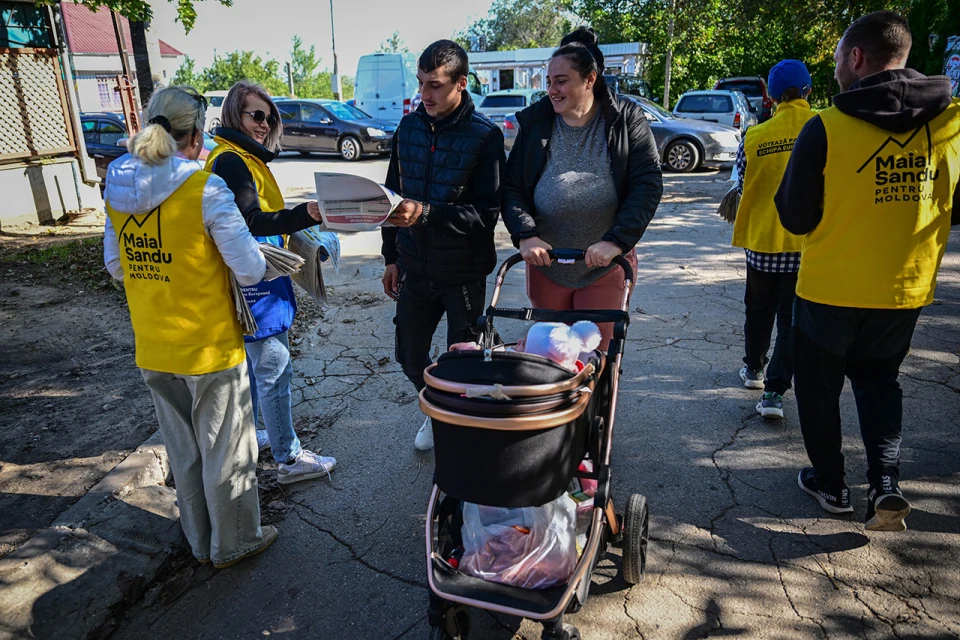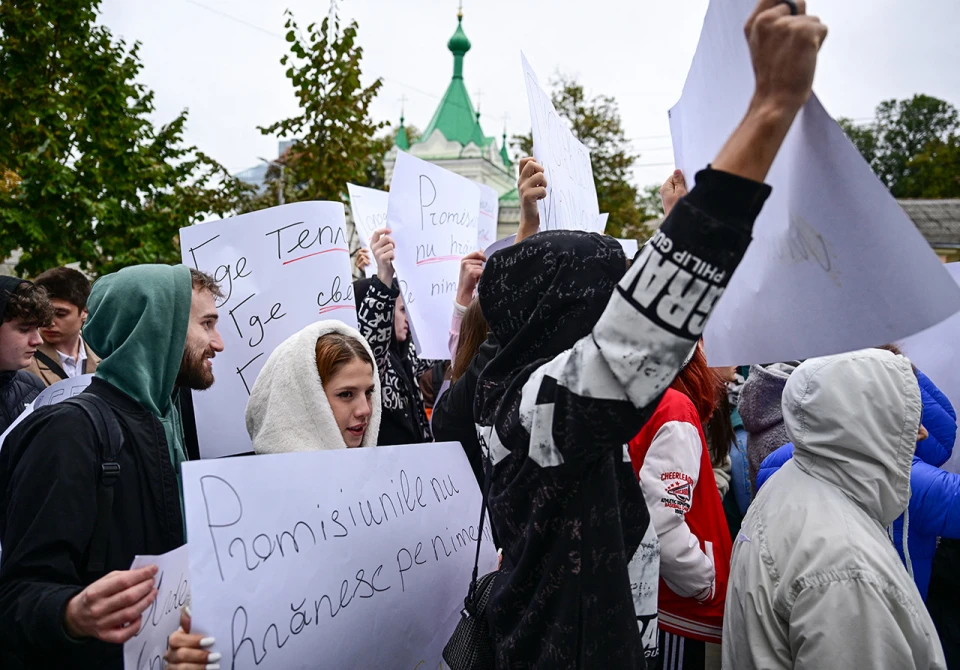
Election hijacking. Moldova on eve of voting
Moldova has revealed Russian attempts to influence the presidential election and European integration referendum, both set for this Sunday, October 20
Russia's first tactic is relying on an extensive corruption network, built on the principles of multilevel marketing and mutual cover-ups. This "network" was organized by fugitive oligarch Ilan Shor using Russian funds, and its participants are expected to vote in sync for the chosen candidate under his direction, aiming to overthrow the current government.
The second tool of influence is the church. Clergy from the Moldovan Metropolis, representing the Moscow Patriarchate, have actively engaged in pro-Russian propaganda and are also under Moscow and Shor's control.
To these Russian manipulations, we should add the concerns discussed in the Ukrainian information space - a forceful scenario, in particular, Russia's use of critical infrastructure for an operation to take over the country in a politically tense period.
Despite the fact that Moldovan authorities are sounding the alarm, the role of Transnistria in both schemes is largely silenced, while the separatist South and pro-Russian North are underestimated.
Geopolitical springboard
Traditionally, elections in Moldova revolve around the issue of geopolitical choice: “for Europe” or ‘for Russia’. According to previous opinion polls, the current president, Maia Sandu, who represents pro-European forces (in particular, her party, Action and Solidarity), is in the lead. However, Russia is trying to influence at different levels, infiltrating controlled candidates into different electoral segments - from those who openly support an aggressive pro-Russian agenda to those who take a “neither yours nor ours” position.

Photo: Getty Images
So far, 11 candidates have been registered, most of them fictitious. The top three, in addition to Sandu, are former Prosecutor General Alexandru Stoianoglo, representing the Socialist Party (the party has long been an outpost of Russian influence, but has lost ground in recent years to the Shor party), and Renato Usatîi, the former mayor of Belz, who is considered a likely Shor candidate.
Shor's strategy is to support several candidates who act in parallel, promoting Russia's interests through different channels for different segments of the population. Although such a strategy will not lead to a victory for any candidate over Sandu, it will form the basis for new political alliances before the 2025 parliamentary elections.
For example, while Usatîi promises a "strong hand," Irina Vlah (former bashkan, or leader, of the Gagauzia autonomy) presents herself as a "pro-European candidate," though she won local campaigns through photos with Putin or visits to Moscow. Another candidate linked to Shor, Victoria Fortuna, a former anti-corruption prosecutor, positions herself as a deeply religious supporter of traditional values, starting her campaign in Transnistria with a symbolic release of a "peace dove."
Thus, some candidates call for strengthening "neutrality," others accuse the government of "dragging Moldova into war," while others advocate for maintaining dialogue with Moscow.
Mutual cover-up
Ilan Shor became known not only for his political activities but also for his involvement in corruption schemes. He was sentenced in Moldova to 15 years for crimes related to the "stolen billion" case - a banking fraud in which funds equivalent to 12% of the country's GDP were siphoned from Moldovan banks. Shor now participates in politics remotely, mobilizing his supporters through video messages on a large plasma screen. After his namesake "Shor" party was declared unconstitutional in 2023, he relocated to Moscow, where he launched a political project called Pobieda (Victory), which includes schemes to manipulate elections.
Recently, the Moldovan publication Ziarul de Garda published an investigation revealing how Shor's "network" operates for vote buying. This network is structured like a multilevel marketing scheme, where participants recruit new "supporters" in exchange for financial rewards, which they receive on cards from the Russian bank Promsvyazbank, linked to the Russian Ministry of Defense. Transnistrian "banks" assisted in cashing out the money from the Russian bank.
The coordination of the "network" occurs through groups and chatbots on Telegram, directly managed by curators from Russia. Members of the network participated in paid protests, spread propaganda, and underwent ideological training themselves. During the elections, they are instructed to vote for the candidate announced by Shor on Friday, the day before the elections.
Shor claims that his "network" consists of 800,000 citizens of Moldova (with a total population of 2.53 million); however, experts argue that no more than 130,000 are involved in the corruption scheme. One of the Telegram channels registered 70,000 users. Nevertheless, even this number could provide a few additional percentage points to the "Shor" candidate.

Photo: Getty Images. Demonstrations against Moldovan President and re-election candidate Maia Sandu and against Moldova's accession to the European Union, which will be voted on in an upcoming referendum, in Chisinau on October 12, 2024.
Church affairs
Another candidate is Victoria Fortuna. Although she is not considered viable according to sociological forecasts, Fortuna attracts attention due to the deployment of yet another influence scheme in Russia's interests. According to local media, the collection of signatures for her nomination was facilitated by clergy from the Moldovan Metropolis, which is under Moscow's control.
Prior to this, around 200 Moldovan priests made a "pilgrimage" to Russia, during which they received cards from Promsvyazbank. Funds were regularly credited to these cards for recruiting believers to support Victoria Fortuna.
One of the main coordinators of the church scheme turned out to be Dmitry Chistilin, who was recently detained in Moldova and handed over to Ukrainian security services. His last organized action was the Path of Peace march - a religious demonstration aimed at supporting Fortuna.
Power scenario
In Ukraine, attention is being drawn to another possible scenario that Russia may pursue—a forceful one. Ukrainian expert Andriy Klymenko points out that Russian ships still have access to Moldovan ports in Giurgiulești, located at the borders of Moldova, Ukraine, and Romania. He highlights that under such conditions, Moldova could experience a "Crimean scenario," where Russia might deploy special forces to the country, similar to what occurred during the annexation of Crimea in 2014.
"From July to September, the monitoring group of the Black Sea Strategic Studies Institute recorded at least five direct shipments from Russian ports to Giurgiulești. Four of the vessels were owned by Turkish shipowners, and one was from an offshore jurisdiction. Of course, the ultimate owner could be anyone," Klymenko noted.
However, similar signals have emerged before: in 2023, information surfaced about the preparation of "titushky" groups - local criminal figures with ties to the FSB who are based in the occupied territories of Ukraine. These groups could be involved in disturbances at mass events. Moreover, youth groups have been used by Shor in protests since 2023, when organized demonstrations began to gain momentum.
Questions without answers
Ilan Shor has been under U.S. and EU sanctions since 2023 for his involvement in attempts to destabilize Moldova, and journalistic investigations have confirmed that these sanctions are well-founded. Meanwhile, both his "network" and the engaged local clergy have utilized financial institutions in the occupied Transnistria to cash out Russian funds.
In the context of mass bribery ahead of the elections, Moldovan law enforcement reports numerous arrests, searches, and restrictions on cashless transactions.
However, their reach does not extend to Transnistria - the Transnistrian figures have not been included in sanctions or placed on national wanted lists during this time. The only incident involves Ukraine placing the so-called Minister of Foreign Affairs of Transnistria, Vitaliy Igantiev, on its wanted list, but Moldova has been slow to assist in this case, as was the case with Chistilin. This may be because Romanian security services were previously pursuing Chistilin in Bucharest, making it difficult to "cover up" the case.
At the same time, cash withdrawals from Russian bank cards occur smoothly in the Transnistrian enclave, which raises questions about the Moldovan authorities' oversight.
Moreover, occupied Transnistria remains a center for the physical presence of Russian military forces (including the Russian Armed Forces, the peacekeeping mission controlled by Russia, and the local quasi-army, also under Russian control).
At the same time, countermeasures against Russian influence do not limit Russia's ability to utilize the potential of Transnistria in various scenarios. In response to the revealed information about Shor's "network," searches of local curators have predictably begun, while Transnistria continues to be "left out of the picture."
- News











































